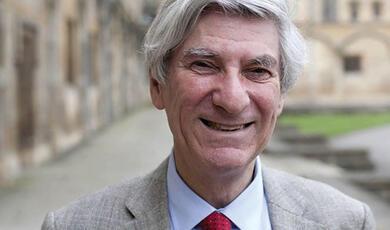Human Rights and Welfare
Share
- Details
- Text
- Audio
- Downloads
- Extra Reading
Issues of British human rights and European law affecting, for example, the rights of a prisoner to artificial insemination, and the rights to treatment of single persons and same sex couples. What attention should be paid to traditional family forms in considering the welfare of babies who may be born as a result of treatment? What right does the law have to stop anyone having a baby with the help of technology? Do children need a father and a mother?
Download Text
Human Rights and Welfare
Professor the Baroness Deech DBE
After the introduction of the European Convention on Human Rights into British law by the 1998 Act, everything is different. Broadly speaking, it elevates the rights and aspirations of the individual over legislation that was originally designed to suit largely only the public and the executive good. It permeates our written and unwritten law; it tips the scales of justice even where an older British statute had already attempted, through nuanced drafting, to balance the rights of the individual versus society. And so in the field of infertility, where the interface between individual desires and public health and ethics is particularly intimate, it has a substantial impact on the application of the infertility laws, and one that is not always expected.
I shall set out the background of the particular rights involved, and then look at their impact on two areas, that of the prisoner's right to AI, and then on the issue of whether a baby needs a father. This latter question is not the same as whether there should be discrimination against lesbians and single parents, but the two are often conflated, with confusing results. Section 6 of the Human Rights Act 1998 requires public authorities to act in compliance with the Convention unless they are prevented from doing so by statute; thus an ambiguity in statute has to be resolved by reference to human rights principles. Failure to consider and comply with human rights obligations will be a ground for review in judicial review proceedings brought by victims of the alleged failure; so public bodies must apply human rights in all aspects of their work, save where the exceptional issues usually attached to each right (national security, public safety, economic wellbeing of the country, prevention of disorder or crime, protection of health or morals, protection of the rights and freedoms of others) are considered to prevail, and even then the interference must be 'proportionate'.
The question most often posed in this field is, 'is there a right to a baby', or to infertility treatment, or to successful infertility treatment? The obvious answer is no, because all rights have a correlative duty, and there is no duty on any person or on the health service or on researchers to ensure that someone else has a baby. Even between married persons, there is no duty to cooperate in fertility. The marital rape exemption has been abolished, and in general the father or husband has no say in whether the mother of his child has an abortion or not. A wife cannot demand fertile intercourse; parenthood is, or should be, a matter of agreement, negotiation or at least tolerance. We know from our study of infertility treatment, there is no assurance that any one of us can ever be guaranteed by medicine a baby of our own. Is there then a right to enable everyone to access all available fertility treatment in any circumstances?
Art.8 of the Human Rights convention grants the right to respect for private and family life. Art. 12 grants the right to marry and found a family within national law. Art. 14 declares that there should be no discrimination on any ground in the enjoyment of the rights and freedoms set out in the Convention. We should remember the historical background against which these rights were drafted. They were drafted in the aftermath of the Second World War and express, inter alia, the distaste for enforced sterilisation measures and prohibition of marriage between classes of persons that were features of the war and other systems of conflict and dictatorship since then. I suggest that Art. 12 really means that society as a whole should not prevent individuals from procreating within the legal structure of that country. This does not help us to interpret the complicated issues that can arise in relation to fertility treatment today, most of which would have been beyond the ken of the drafters.
In a civilised society there is no right to procreate at will (O'Neill,Autonomy and Trust in Bioethics (2002) p.58; John Harris, 'Rights & Reproductive Choice' in The Future of Human Reproduction (1998), pp. 5-7; John Robertson, Children of Choice (1994); Dworkin, Freedom's Law(1996) p.104). A regulatory system like ours maintains the basics of reproductive autonomy, for example, the right to consent and to refuse, the right to avoid reproduction as well as access to the technology as democratically distributed, and abortion. There is no free for all in the societies that we consider advanced. They regulate, for example, the age of marriage and consent to intercourse, abortion and incest.
Logically there can be no right to infertility treatment. It is too artificial a procedure to be in any way counted as a natural right or one essential to life, any more than one can have a right to good health and all possible treatment at any cost within a national health service. No patient can ever be guaranteed successful medical treatment because nature has the last word still: we can only contemplate a promise of access as determined in a democratic society without unlimited medical resources. Where the facilitating of pregnancy has to include third parties beyond the confines of husband and wife (hardly private), then accountability and medical ethics must contribute to the decision, because it has a knock-on effect for all treatments of the infertile and others.
In general, to press for a 'right' must mean that existence without that right is a blighted and uncomfortable existence. In a society where many choose to remain childless and where availability of contraception and abortion was counted in the 1960s as one of women's triumphs and, indeed, human rights, it is impossible to argue that life without a baby is a condition for which there must be a remedy at all costs. One of the difficult aspects of chairing the HFEA was to put across the message and create the policies whereby, at one and the same time, potential patients secured reasonable access to infertility treatment (a battle with the NHS has yet to be seriously fought), while protecting childless women from the image of themselves as defective vessels needing expensive medicine to make them whole.
Prisoners' rights to start a family
The cases on prisoners' rights illustrate the dilemmas posed by human rights to fertility, albeit not decided under the HFE legislation. The leading case is that of Kirk Dickson (see also Gavin Mellor's case, refused access to AI, (2000 LTL 4/8/2000)). In 1995 Dickson was convicted of murder for kicking a drunken man to death, and sentenced to life imprisonment. While serving his sentence, he began a penpal relationship with Lorraine, who was serving time for benefit fraud and already had 3 children. They were married after her release (note that British law does not generally prevent marriage of prisoners - but does block their procreational activities). Dickson was due for release in 2009, by which time Lorraine would be over 50 and unable to conceive naturally. The couple's application for AI was rejected; they complained to the High Court and Court of Appeal that their rights to family and private life, to marry and found a family were being denied, but they lost. The ECHR gave judgment in 2004 (Dickson v UK, ECHR 18/4/06 App.44362/04)). The European judges were clear in denying the right of a prisoner and his wife to reproductive technologies for childbearing while he was incarcerated. The argument that society allows children to be born to single parents in poor circumstances was not regarded as sufficient to entitle the prisoner to achieve something similar. This was because the state was being asked to become an active accomplice and participant in the conception. 'I believe a responsible state to be right to require of itself standards higher than those beyond its control in the free procreation market', said Judge Bonello. The court paid attention to the fact that the couple had not yet experienced normal living together and that the circumstances in which the child might be born would not be good.
To general surprise, the Grand Chamber of the European Court, consisting of 17 judges, allowed the appeal by the Dicksons (albeit that by 2007 he had been moved to an open prison, was allowed home visits and Lorraine was 49) and awarded them damages for deprivation of their human rights. The Court held that Art. 8, the right to private and family life, was engaged and included respect for the decision to become parents. Prisoners retained their human rights on imprisonment and any restriction of them must be justified in each case, and not dismissed because in general they would offend public opinion. The competing interests of the state and the parties had not been properly weighed by the British authorities, said the Court, nor had the issue of proportionality of interference with the prisoners' rights, so a blanket refusal of AI amounted to a breach of Art. 8. Little attention seemed to be paid to the article of English law that was so important in the court below, and that dominates our family law, namely that the welfare of the child is paramount in decisions. It is ironic, in the light of the dismissal of the need for a father principle, which I am coming to shortly, that this decision was handed down within a week of a ruling by the Court of Appeal that a mother had the right to keep the birth of his child secret from the father: we are very confused over welfare, fathers and procreation. The decision is odd in that it is in an area where the European Court normally respects the diverse practices and discretion of individual nations within Europe. The European Court did not invent a right to procreate; nor did it insist that conjugal visits be granted, or that reproductive facilities be granted to all citizens; it focused instead on the quality of the balancing of considerations within the policy of our government in refusing AI to prisoners. Nevertheless, the decision, inconsistent though it is, and based on a procedural argument, may be interpreted by lawyers in future cases as having originated a right to reproduce within the list of human rights.
The decisions before Dickson have been criticised on the ground that to deny prisoners, both male and female, the right to procreate, at least if married, is a greater denial of their rights than is needed given that they are incarcerated. Some other countries routinely grant conjugal visits, so the UK ban on AI seems harsher. It has been alleged that by denying prisoners the right to procreate, largely because of doubts about the welfare of the baby, a new form of eugenics is being practised, in that the real reason for the denial is distaste for the prisoner's crime and no wish to see him reproduce himself, no doubt perpetuating his criminal characteristics. It is also the case that prisoners' wives suffer as a corollary of their husbands' imprisonment, and that their own rights to start a family are imperilled. The British judges' view of that situation inMellor was that the prisoner has brought his situation on himself. So too the wives in the two cases under consideration for they both married men who were in prison, knowing that there could not be a relationship outside prison for a long time. British judges have also taken seriously the welfare of the unborn baby of the prisoner, although philosophically speaking it is hard to speculate about the welfare of a non-existent child. On the other hand, given what is known about children's welfare, it is reasonable to draw the conclusion that the child of a de facto single parent whose partner is in prison for a long time must be at risk (the decision about access to AI is made in the first instance by the Family Ties Unit of the Prisoner Administration Group of the Prison Service). It is also argued that our courts do not take enough care to protect personal privacy and the liberty to decide on reproduction. We are talking however of prisoners whose actions have been deemed to deserve removal from the normal liberties of society for a long time, because they destroyed the liberty, indeed, the lives of others.
Contrast this with the Israeli action in the case of Yigal Amir, the assassin of Yitzhak Rabin, prime minister, in 1995, a killing undertaken in order to derail the then peace process. Under Israeli law prisoners are allowed to marry and have children, but in his case, because of the heinous nature of the crime, the right to marry had been refused. Nevertheless he married, by proxy, Larissa Trimbobler, a 42 year old divorced mother of four, who shared his political views. After more than two years of petitioning for the right to consummate their marriage, she was allowed a conjugal visit in late 2006; the courts had held that prisoners have these human rights. She gave birth to a boy in 2007. Israel is a very pro-natalist country, but these actions caused some public dismay, because they amounted to nationalistic defiance as well as human rights for prisoners.
The leading case in the US is Gerber v Hickman (2002), where after some vacillation court by courts, Gerber was finally denied the right to AI for his wife. He was serving a sentence in California of 100 years for murder and his wife was 41. The court held that there was no constitutional right to procreate while in prison. Conjugal visits too were denied to lifers because there was no expectation that they would ever be reunited with their families.
The need for a father
Human rights has operated in a method that could be described as negative, to remove the principle that a baby needs a father from British IVF law. When the 1990 HFE Act was passed, there was a debate in Parliament between those who would have confined IVF treatment to heterosexual couples, and those who would allow it for any person. A compromise was reached: the doctor who was considering whether or not to treat a woman was required by s.13(5) to consider the welfare of the future baby (was there a criminal conviction for child abuse in the family, for example), including the child's 'need for a father'. This by no means prevented single women or lesbians from getting treatment: it was simply one of the concerns of the doctor, but it expressed an important principle, and in considering changing the law, it has to be acknowledged that we are where we are, in that fathers' importance was recognised. From 1999-2006 1.9% of IVF was for single women and declared lesbians; and 38.1% of DI, 2247 such women in 2006, a number growing year on year.
Nevertheless, it was felt by the government that such a consideration represented discrimination against certain categories of women, and it proposed to remove it entirely from the law. The argument was that the last barriers of discrimination against gay and lesbian people should be broken down, as in adoption law. However, heterosexual unions have always been closely linked to the objective of forming a home for having and raising children, whereas until recently, the emphasis in the drive to recognise gay and lesbian relationships has been based on the need to recognise a close personal relationship, every bit as enduring and valuable as heterosexual ones. If the two unions are different, then there is no discrimination, and no requirement for the law to treat all unions in the same way, whether because they are biologically or socially distinct. After all, the law still withholds recognition from incestuous unions, polygamous unions and underage marriage: it is simply not the case in Britain that any union of two people is treated the same in law.
The structure of the Human Fertilisation and Embryology Act 2008 Act is two-fold. The first half confirms every HFEA decision taken in the last 16 years or so advancing the techniques of infertility and embryology, and opens the door to more, for example, further stem cell work, animal-hybrid embryology, the use of stored tissue from persons now unable to consent to research on it and PGD. The second half is an exercise in social engineering, adapting the use of IVF to new family formations, parents who are two men, two women, or one alone, and enabling the registration on the birth certificate of two persons of the same sex. In pursuit of this form of non-discrimination, the study of the welfare of the child, and respect by the public for the traditional family, have been overridden. Arguably, there must be 'discrimination' in physical matters relating to the difference between the two sexes and childbirth: a man cannot give birth (yet) and a woman cannot have the sexual and reproductive experiences of a man, even with a sex change operation (which of course would then mean that she is a person of the male sex for legal purposes).
It would be widely agreed that there should be no discrimination in the provision of medical services, so there seems to be a prima facie case for treating every person who enters a fertility clinic in the same way. The provision we are considering, however, relates to the welfare of the child. It is also the case, and widely accepted, if not approved of, that medical services in this country are distributed on a discriminatory basis, whether by region or lifestyle, on the ground that the resources are finite and should be used where they best suit the population or on persons for whom they will provide lasting help, and not go to waste, for example, in decisions about treating the obese or smokers. (I pause for a moment to note that withholding treatment from those categories or not allowing them to adopt children appears not to arouse the charge of discrimination, whereas to withhold treatment from drug users or sports ailments in some circumstances would.)
Moving on a step further from discrimination, this is a society in which we are enjoined, especially women, to take care of our health and of that of the next generation. The government is determined to protect the wellbeing of children now and of unborn ones - hence the concern over diet, smoking, exercise, poverty, housing, education, vaccination, fluoride in the water supply and any other factor known to influence the outcome of childhood. It does not seem wrong therefore to consider the welfare of children in the administration of IVF. The HFEA Code of Practice gives guidance to clinics on the assessment of the welfare of the unborn child of patients. It focuses on assessing whether there is a risk of serious harm to the unborn child, whether physical or psychological, and mentions drugs and alcohol. Where the patient is a lone woman, the clinic is required to consider her ability to meet the child's needs and whether there are others in her social or family circle willing to share that responsibility with her. This means inquiring whether there are other men in her life, such as a grandfather or uncle, who would provide a male role model and input into the child's life. Relative to the assessment about harm, the inquiry about a male presence is a minor factor. Nevertheless, the provisions seem fair enough if one is concerned about the welfare of the child.
The public notion of what is a family for the purposes of childrearing is fluid; and certainly there is no longer any insistence on what might be termed old fashioned standards about family structure, marriage and legitimacy. More than half of the babies born in this country are born out of wedlock, and single parenthood is an established factor in children's lives. So I will focus on the practical, rather than the moral or the speculative arguments.
I shall analyse the question whether a child needs a father (to the extent that this is an essential component of its welfare) from three perspectives, and set them out in general terms first before going into the sources. The need for a mother incidentally, remains unchallenged. I maintain that every child needs a father and that to pretend otherwise is to turn common sense, research and policy on their heads.
First we are where we are. To remove from the law the principled provision that the child needs a father for the sake of its welfare, is to make a fresh statement to the effect that a child does not need a father. It sends a message, insofar as legislation does that, to men at a time when many of them feel undermined as providers and parents, a message contrary to government policy in this field. England and Wales have the highest divorce rate in Europe and it is all too common for men to walk away from their parenting and financial responsibilities. The Child Support Agency may have foundered in its pursuits, but it has never been argued that men should not pay for their children, nor that they should not take responsibility, both financially and socially. Divorce court judges hold that contact with a father after parents separate is a good thing and that every effort should be made to maintain it. In June 2008 the Department for Children, Schools and Families issued a White Paper, Joint Birth Registration: Recording Responsibility, proposing that mothers should have to identify the father on registering the birth, and he will have to take a DNA test; and men who object to being omitted from the birth registration will be able to seek DNA testing and be added if it is positive. Ministers said that this plan underlines the right of all children to have two parents and will help unmarried fathers play a fuller social and financial part in their children's lives. This government introduced paternity leave. This surely means that children need fathers. Children who find out that they are adopted are now allowed to seek their parents, after years of pressure from those who feel the need for an established true identity. The new law of 2008 will enable donor conceived children to obtain identifying information about donor fathers, where the donation was made after the removal of anonymity; and of course anonymity has recently been removed from sperm donors. The UN Convention on the Rights of the Child says that every child has the right to know and be cared for by their parents. All this adds up to a massive statement of principle, nationally and internationally, in terms of state policy and individual cases, that to have a known father is, if not always achievable, highly desirable, and that where he exists and is identifiable, he should be named and involved.
Second, the 1990 law was not a prohibition; it did no more than cause potential patients and their clinicians to reflect on the situation that presented itself and ask whether all will be well, or as well as can be predicted, if a baby is born. As the HFEA Code of Practice evolved over the years, it downplayed the father issue and focused more on harm, as I have already explained. Many GPs, when questioned, with the patient's consent, about the possibility of harm to the child, felt unable to answer as they were not in a position to judge, nor did they feel that they could voice such an opinion on ethical grounds. In sum, a patient was rarely refused treatment despite the assessment.
Third, there is a wealth of research that shows that children need fathers, not just a parent or parents. They need to see complementary roles and the relationship between the sexes as they are growing up. The home should be a microcosm of society, a place where the interaction between the sexes and, hopefully, shared responsibility are manifest, where adult conversation takes place, where children can see how each sex treats the other, complementary roles, two sets of relatives, two sets of interests and life experiences, backup support if one parent is absent. There is also research that shows that children deliberately conceived and raised by a single mother or two parents of the same sex do well, but it is limited, most of it carried out by one researcher, or by women not men, and of necessity the children are very young and the families self selecting. There is also some research showing that these children suffer from the inevitably confused, competitive and secretive family relationships. Recent reports have placed Britain at the bottom of international league tables for the welfare, education and happiness of children, and this is associated with single parenthood and the lack of a role model, not poverty alone. This is not to stigmatise single parents who do a very good job raising their children, especially those who have been left by the other parent to do the job. Nevertheless, the optimal conditions are a household of two parents. There is an analogy: we all need a minimum income. Many people manage admirably with less and make an excellent life, but this does not undermine the argument for a certain level of resources for everyone as a goal.
It may be argued that pessimistic statements about single parents only apply to those unfortunate enough to have found themselves in this situation because they were deserted by their husband/partner or became pregnant out of wedlock without planning to do so. Poverty may well be the dominant characteristic in these situations The research I am about to mention however relates to the lack of a father, regardless of whether the parents are middle class, well off and deliberately planning to have a child by IVF or find themselves accidentally in that situation. After all, to a child who misses a male presence in the home, the fact that her mother(s) are well off and planned to have her is not relevant or comprehensible.
According to the Centre for Social Justice's summary of the research carried out by others, fathers play a unique and crucial role in nurturing and guiding children's development. Indeed, the importance of fathers in children's lives is now almost uncontested within social science research and policy (Flouri, E., Fathering & Child Outcomes (2005)). A recent report (Stanley, K.ed., Daddy Dearest - Active fatherhood and public policy(2005)) says that fathers contribute special qualities which enhance the wellbeing of the child, and that deprivation can lead to psychological, social and community disadvantages. The NSPCC, in arguing for flexible working hours, presented research (Response to Work and Families: Choice and Flexibility (2005)) showing that fathers' involvement with their small children was positively related to their later educational attainment, the children were less likely to be in trouble with the police, would have more satisfactory relationships with their parents in adolescence and with other adults, and protected children against mental health problems even if the parents separated when the child was older. They found that boys whose fathers are more involved in their lives are more self confident and less likely to take drugs, to feel depressed and alienated. Carlson ('Family structure, father involvement, and adolescent behaviour outcomes', (2006) 68 Journal of Marriage & Family137) found that father - but not mother - involvement is a key predictor of teenage behavioural problems. In areas such as emotional intelligence, self-esteem, competence and confidence, the father's influence cannot be duplicated or replaced easily by the mother, no matter how good a mother she is. 'During middle childhood, paternal involvement in children's schooling in both single-father and two parent families is associated with greater academic achievement and enjoyment of school by children.' (Nord, Brimhall & West, Fathers' Involvement in Their Children's Schools US Dept. of Education, 1997.) The Culture of Youth Communities, a report in 2008 by the Prince's Trust, suggests that teenagers are joining gangs because they have no adult role model in life. This is a tiny sampling of the hundreds of research articles highlighting the importance of fathers.
To this should be added the statistics that unions of lesbians are less stable than unions of gay men and that both are less stable than marriage and heterosexual cohabitation (Benson, H. (2006) 'The conflation of marriage and cohabitation in government statistics' Fractured Families, App. 3 Centre for Social Justice; Andersson et al, 'The Demographics of Same Sex Marriages in Norway and Sweden', (2006) 43 Demography 79; Stacey & Biblarz, 'Does the sexual orientation of parents matter?' (2001)American Sociological Review p.178; Family Research Council, US). It has always been important to carry public opinion along with the forward progression of IVF, and a recent poll (ComRes for CARE, November 2007) showed that 77% of over 1000 people thought it was important for the need for a father to be included in the welfare assessment.
Such research as there is on children raised in same sex households is inconclusive because the samples are too small and it is too soon. Dr Claire Sturge, who as a child psychiatrist has often assisted the court in disputed custody cases, has noted that same sex families have a problem with the absent biological parent and his rights. Although she has in general no qualms about the outcome for the children she notes that the father factor tends to be excluded from the outcome research by the female dominated research exercises, usually carried out on well educated middle class women. The family will obviously be unusual to others, the child will be teased about it and is likely to become sexually aware at an earlier age than other children because so much information has had to be given to them by their parents. Adolescence may be a time of greater resentment about the differences, but we have yet to discover this.
In the discussion of this clause in the Bill, the government peers in the Lords were apparently under instructions to ensure removal of the consideration of the need for a father. After discussion of amendments, the wording 'need for supportive parenting' replaced it. This seems to me to be the worst possible outcome. 'Supportive' has no particular objective meaning; rare would be the patient who admitted to not planning to be supportive. Moreover it refers to the future and one can only guess at whether the person seeking treatment will in fact be supportive when the time comes. 'Need for a father' was specific and capable of being assessed, if not without difficulty. It may well be that IVF treatment will continue to be offered in very much the same way as hitherto, but a social experiment has been embarked upon and men are the worse off. I have mentioned before that IVF carries the risk of reducing men to no more than donors of gametes, with no real role to play in the future of their children, and this new provision exemplifies just that. It is time to place the rights of the children above those of their parents.
© Professor the Baroness Deech, 11May 2009
This event was on Mon, 11 May 2009
Support Gresham
Gresham College has offered an outstanding education to the public free of charge for over 400 years. Today, Gresham College plays an important role in fostering a love of learning and a greater understanding of ourselves and the world around us. Your donation will help to widen our reach and to broaden our audience, allowing more people to benefit from a high-quality education from some of the brightest minds.


 Login
Login







